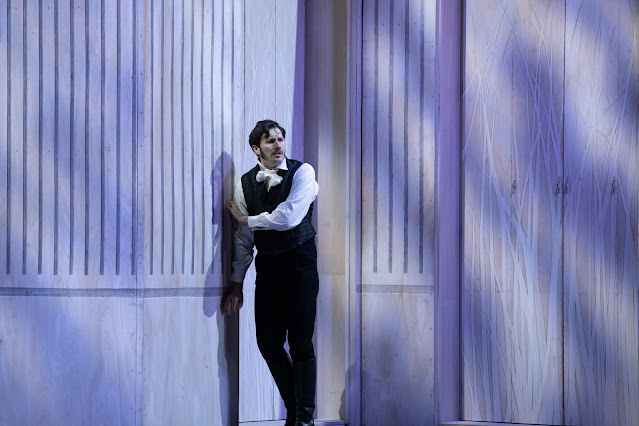Tatiana – Anush Hovhannisyan
Onegin – Samuel Dale Johnson
Olga – Emma Stannard
Mme Larina – Amanda Roocroft
Prince Gremin – Matthew Stiff
M. Triquet – Joseph Buckmaster
Zaretsky/Captain – Konrad Jaromin
Solo tenor – Phillip Costovski
Julia Burbach (director)
takis (designs)
Robert Price (lighting)
Jo Meredith (movement)
Opera Holland Park Chorus (chorus director: Richard Harker)
City of London Sinfonia
Lada Valešová (conductor)
 |
| Eugene Onegin (Samuel Dale Johnson). Images: Ali Wright |
Sharing a single set by takis with Carmen—typically
resourceful, sustainable practice for Opera Holland Park—Julia Burbach’s Eugene
Onegin proved a puzzling affair. The idea, I think, was to move between monochrome
and colour, perhaps playing with memory and/or dreaming, but too much remained obscure
or arbitrary (at least for me). Burbach seemed unsure whether to opt for
realism, something more symbolic, or even a coherent melange of the two. Presumably,
the uniform light colours of the first scene were intended to evoke a sort of
Chekhovian boredom, but it seemed at odds with Pushkin, let alone Tchaikovsky. Having everyone dressed in similar finery in that
opening scene also suggested a chorus of nobles rather than peasants. For these
were clearly the same people we encountered in the ball scene, and I do not
think the intention was to suggest some sort of Russian Petit Trianon. Quite
why some were playing badminton, I have no idea; it proved distracting in the
wrong way, as had ‘peasant’ dancing earlier on. A turn through colour to black largely
made emotional and narrative sense, yet details continued to sit oddly with the
overall ‘picture’. Nothing ever quite moved convincingly, nor settled down.
It was also unquestionably the most heteronormative Onegin I have seen: a perverse distinction, one might say. Not only is there no sign, no inkling, nor even the slightest twinkling of an eye, of homosexual subtext; the characters are conventional enough in their relationships to be plausibly heterosexual. Perhaps if one were viewing work and creator from a Putinesque standpoint, that might signal cause for celebration. To the rest of us, it may seem strange or evasive.
That said, the cast did a fine job within these confines. Jack Roberts (an OHP Young Artist) and Emma Stannard gave a fine impression of Lensky and Olga as a young couple giddily in love. Their sheer enthusiasm proved infectious, not least given the curiously static production. Roberts’s sappy tenor and Stannard’s deep-toned mezzo proved just the vocal ticket too. Samuel Dale Johnson’s offered a thoughtful, well-sung performance as Onegin, both beguiling and infuriating in his mood swings. If the visual haunting demanded by Burbach in the Letter Scene seemed somewhat contrived, Dale Johnson’s subtler vocal version thereafter, culminating tragically in buyer’s remorse, was far more convincing. Anush Hovhannisyan’s Tatina gained in confidence as the evening went on: character development of course, but also, I think, in strength of performance. By the final scene, this was a formidable portrayal indeed. There were no weak links onstage, Kathleen Wilkinson’s Filipievna and Konrad Jaromin’s appearances as Zaretsky and the Captain especially catching the ear.
 |
| Tatiana (Anush Hovhannisyan) |
Lada Valešová’s direction of the City of London Sinfonia seemed, laudably, engineered to follow these particular performances and production, rather than being imposed upon them. Was her languorous, intimate way with the first act too much of a muchness? That is probably a question of taste. It is not how I hear the work, but there was a thoughtful approach at work here. I missed a sense of abandon in the big public scenes, though Valešová’s scrupulousness offered alternative rewards. One should also bear in mind that she was working with—and emphatically with—a chamber orchestra. A larger orchestra, as well as a different production, may well have brought forth a different musical reading.



